New 100-mile drinks region emerges at English-Welsh border
A major new pact between four UK counties is set to revive a 1,000-year-old region called The Marches. Bee Costello-Bates reports.
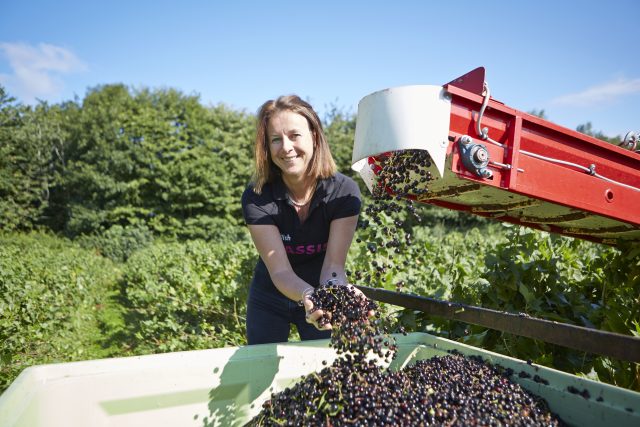
Drinks producers have described a move by four counties to promote economic growth under one region called The Marches as simply “awesome”.
The Marches Forward Partnership is a pact by Herefordshire, Monmouthshire, Shropshire and Powys to unlock millions of pounds from the government to promote and grow their rural economies along the English-Welsh border.
The Marches will aim to deliver cross-border successes, to attract inward investment and to improve distribution channels – including those for the wine, beer and spirits industries.
Monmouthshire Council Leader Mary Ann Brocklesby, who heads up The Marches’ food, drink and tourism plan, told The Drinks Business that “exciting times lie ahead”.
“Our collaboration was a no-brainer since our counties share many common features, including our magical landscapes, historic market towns and local economies that are predominantly small businesses,” she said.
“One of our priorities is to improve local and national supply chains so that many rural producers can benefit from future growth and investment in The Marches.”
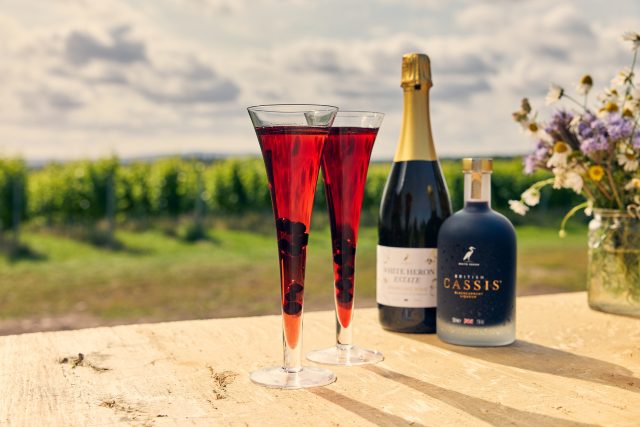
Brocklesby’s team will leave no stone unturned, scoping out the viability of a “marque of provenance” for The Marches and for drinks producers to exhibit on their own stand called The Marches at future expos.
The Marches stretch 100 miles down the English-Welsh border from the foodie town of Wrexham in Shropshire to historic Chepstow in Monmouthshire, taking in food festival towns such as Ludlow and Abergavenny, and the historic cathedral city of Hereford.
James Tanner, CEO of Tanners Wines, the largest independent drinks retailer in The Marches, said that having a standalone region to promote drinks produced along the English-Welsh border is a “positive move”.
“Many vineyards here are really benefitting from warmer temperatures,” he said, adding: “The Marches has a unique set of micro-climates that suit the abundance of fruit being grown here. Herefordshire and Monmouthshire towards the southern end of The Marches are producing high quality wines and we’re seeing great results for Solaris, Madeleine Angevine, Regent and Pinot Noir Précoce.
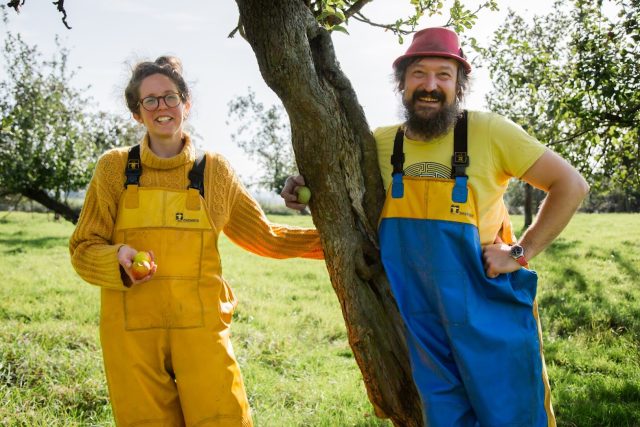
“Higher up in Shropshire, the marginal climate has suited the huge damson industry but there are now some interesting vineyards that are ones to watch, such as Rowton and Colemere.”
Having a stand for The Marches at future drinks expos would be “absolutely awesome”, said Monmouthshire winemaker Robb Merchant MBE of White Castle Vineyard. “The opportunities to reach London, UK distributors and the international market at our own Marches stand would be great.”
Merchant, who trained at Plumpton College with his wife Nicola, said they took a risk and planted vines with climate change in mind – and it’s paid off.
White Castle’s range of international, medal-winning wines include Pinot Noir Reserve 2018 and Regent 2022 – a hybrid variety that Merchant says has come into its own in Monmouthshire – as well as a high-demand fortified wine made in the same way as a Late Bottled Vintage port.
Soils in Monmouthshire share the same ripening qualities as Herefordshire’s sandstone red soils, which feature clay and sandy loam – a county that saw an increase of 19ha of new plantings in 2023, according to WineGB.
The “brick earth” soil here, as Sixteen Ridges describes it, is perfect for ripening – so much so that the brand scooped Silver for its Pinot Noir Précoce 2021 at the 2024 WineGB Awards.
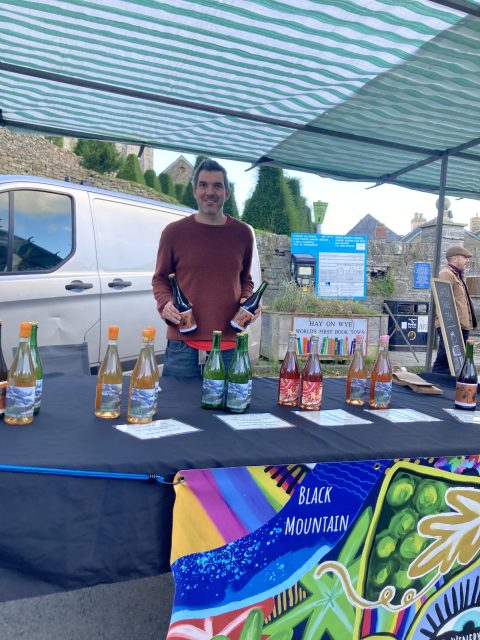
Across to Herefordshire’s Frome Valley Vineyard and owner Jeanie Falconer, who makes still and sparkling wines as well as English brandy, said: “It makes so much sense for all of us living and working here to be cooperating with our neighbours. I’m delighted.
“It would be great to have The Marches stand at a big wine event. I know other areas have done this, I think it would raise awareness of the region and help bring new trade contacts into the area.”
Producers and farmers in The Marches are already benefitting from Rural Enterprise match-funding for new wineries and equipment while many are looking to scale-up, to innovate, and to reach top London restaurants and beyond.
Others are rivalling classic drinks from France and Portugal with British versions of Crème de Cassis, Eau de Vie, Calvados, Champagne, Port, Charmat-method sparkling wine, Calvados and Pommeau.
White Heron Estate’s Jo Hilditch – affectionately known locally as the ‘queen of blackcurrants’ for her 200 acres of fruit – produces the iconic British Cassis from her own homegrown blackcurrants.
In 2023, fourth generation farmer Hilditch, former High Sheriff of Herefordshire, underwent her first vintage of Seyval Blanc, Madeleine Angevine and Reichensteiner grapes and has now launched White Heron Estate sparkling wine.
“It’s so positive to have the support of four county councils to help grow our drinks industry along the English-Welsh border and we would happily welcome more visitors to The Marches to see all it has to offer,” she said.
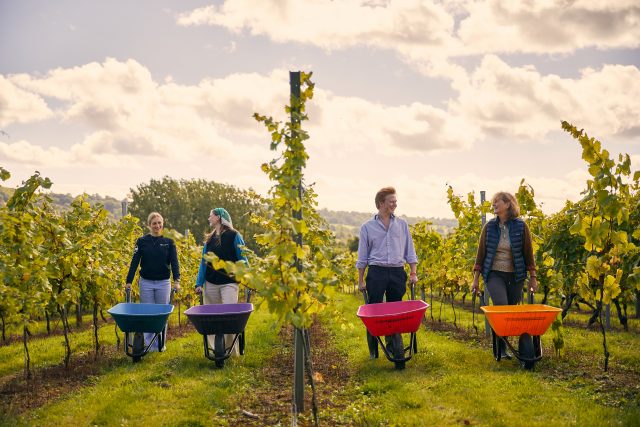
A view shared by Tanner who highlights the array of drinks the firm retails from across The Marches, and who also notes major innovations such as Ludlow Distillery’s apple brandy and Penrhos Spirits, the first distillery to transfer its gin from glass to recycled aluminium bottles. He also advises producers in The Marches that as well as quality, they must price carefully, particularly if competing with classic drinks from Europe.
Cross-border collaborations between distilleries and cider makers in The Marches has already begun. Shaun Ward, master distiller at award-winning Ludlow Distillery in Shropshire, is renowned for his supersmooth gins and whisky, and is now working with cider makers in Herefordshire and Powys on apple-based spirits.
Award-winning Tom Oliver of Oliver’s Cider & Perry worked with Ward to produce a “warming, creamy” Eau de Vie called The Power and The Glory, 42% abv.
Oliver said: “Our Eau de Vie is made from the unmatured spirit from Foxwhelp apples that I chose for their high acidity, expressive apple aromatics and relative lack of tannin.”
Oliver has also launched Grist for the Mill, a 19% abv combination of fresh-pressed Yarlington Mill cider apple juice (4/5), cut with the Foxwhelp distillate (1/5), then matured and aged for 12 months in a half Laphroaig barrel.
“This is a homage to the French drink Pommeau but is less sweet and thus more complexity shines through.”
Demand for Oliver’s new apple brandy distilled by Ward is expected to rocket, despite only being half-way through a six-year process – it is currently ageing in oak casks that previously contained rum, bourbon, sherry, port and white wine.
Partner Content
“Our cross-county products are exploring the cider making skills of Herefordshire with the distillation skills of Shropshire but using influences and knowledge from around the world to arrive at new interpretations of drinks for enjoyment and discussion,” said Oliver who is described by his international fan-base as “the finest cider maker on the planet”.
Also working with Ward on an apple brandy “to rival the finest in Calvados” are Artistraw Cider’s Lydia Crimp and Tom Tibbit who make handpicked, natural ciders from unsprayed, traditional orchards just outside the world-famous book town of Hay-on-Wye, Powys.
Ward has moved Ludlow Distillery on-site next to Ludlow Farmshop – a popular food-tourism destination where thousands of consumers will now learn about The Marches’ gin, rum, vodka, apple brandy and now whisky.
“We produce drinks in a wild region that is so different to, say, the Cotswolds and I often describe the borderlands as England’s Wilderness – so for The Marches Forward Partnership to promote our remote borderlands to wider audiences is great,” he said.
Vast in landscapes yet limited in population – only 750,000 reside in these four counties – The Marches can indeed seem a wild and remote kingdom waiting to be discovered.
Yet here is where the birth of agricultural field formations began 1,000 years ago by the Anglo Normans’ Marchers Lords, sent by William the Conqueror to protect England’s border.
Many of these fields have in turn become orchards, hop farms, vineyards and distilleries, all nestled in exquisitely beautiful hills and valleys, including Herefordshire’s Golden Valley and Black Mountains, the Shropshire Hills, Monmouthshire’s Sugar Loaf and the Brecon Beacons in Powys.
Legendary tales of Arthur and Merlin also originated in the mythical Marches where tales of ghosts and river maidens still abound. Many locals also believe in the invisible “ley lines” of the Golden Valley, which demarcate “earth energies” – perfect conditions, perhaps, for biodynamic and natural winemaking, which ironically has already begun here.
The exquisitely beautiful Golden Valley in Herefordshire is sheltered by the Black Mountains and it is here that several drinks producers have set up – and they’re winning awards.
They include Glyn Bufton and Lloyd Reed, founders of Blackmountains Botanicals with their Hill Billy Gin range, and natural winemaker and Plumpton graduate Mark Smith, who founded Black Mountain Vineyard & Winery in 2009 following a career in conventional winemaking in the UK and overseas.
Smith feels the Black Mountains is the place to make natural wine and is looking forward to working with other counties to help raise The Marches profile as a natural wine-producing region.
“Looking at the local wine in our area, I’ve seen this grow over the last five years with more vineyards being planted, though often still of a small scale when compared to the South-East for example. I think this makes the area really special.
“Also, a number of these folk are growing the vines using organic, biodynamic or regenerative practices, which would be fantastic if The Marches could develop a reputation for this. Small-scale producers mean there are gems to be found, and I think people love discovering them.”
Like many vineyard owners, Smith of Black Mountain Vineyard takes his natural (still and pet nat) wines, which include ‘Shouting at Weather’, to the many weekly markets across The Marches.
Tanner notes that as a retailer, it prefers to buy direct from drinks producers in the region, noting the nature of the small business environment here. That said, many producers are looking for new distribution channels to access London and even overseas.
No article about The Marches would not be the same without mentioning the mighty River Wye, which meanders across three counties of The Marches and comes out in the Severn Estuary near Chepstow.
And while the Wye adds a jaw-dropping beauty to the already dramatic landscapes and microclimates found here, it can often burst its banks throughout the year, cutting off roads, farms and villagers from schools and amenities, along with the odd electricity blackout.
It means life can at times be bleak for any food and drink producer in this ancient region, yet traditions make The Marches so alive. Its market houses provide a centre point for communities, and ceremonial town criers and mayors are still very much respected parts of life on the English-Welsh border.
Anyone interested in buying from businesses here will find a vibrant mix of local cultural economies, such as Hereford, Monmouth, Ledbury, Ludlow, Hay-on-Wye and Abergavenny in the four counties of The Marches, which are predominantly made up of tiny organisations.
To put this economic picture in context, over 10,000 companies in Herefordshire and 14,000 in Monmouthshire have less than 10 employees.
That said, vineyard owners who began planting vines as far back as the 1990s are reaping the rewards of climate change with specific grape varieties, such as Pinot Noir, Regent, Seyval Blanc and Madeleine Angevine, proving a huge success. The Marches is now vying for its place on the world’s winemaking map.
Cider, an important part of life in The Marches, also has its own traditions, such as the Wassail celebrations in January and Morris Dancers during harvest time. While giant Westons Cider plays its part in bringing tourists into this quintessentially English cider region – and is a respected employer in The Marches – it is the smaller craft cider makers whose stories and ciders could be of interest to retailers.
Alex Culpin, founder of Ty Gwyn Cider, which is set between the staggeringly beautiful valleys of Pontrilas – where England literally meets Wales at the border – was bass guitarist in indie Britpop band of the Nineties, Tiny Monroe.
Culpin gigged at major music festivals such as Reading before his father-in-law taught him to make cider and Ty Gwyn is now among the finest ciders in The Marches – he also runs a great little cider bar and holiday accommodation on-site, a feature of many businesses who have diversified across the region.
Project Lead for Visit Shropshire’s Mark Hooper says The Marches is ready and waiting for investment.
“The Marches region is a treasure trove for food and drink enthusiasts. By working together, these counties can showcase their unique culinary heritage, from farm-to-table experiences to artisanal producers, creating a unified destination for food lovers to explore.
“Collaboration across borders highlights the area’s rich diversity and makes The Marches a must-visit for those seeking authentic flavours and unforgettable dining experiences.”
Many in the drinks trade may not have come across The Marches as a new or even ancient region but it’s been around for 1,000 years and many are excited by its new beginnings, including Master of Wine John Downes who said:
“Confession time. I hadn’t heard of The Marches but now that I have, and clocked the vibrant food and wine scene, I can’t wait to visit this beautiful slice of the country. See you there!”
Related news
‘Business as usual’ for Ridgeview as English sparkling wine producer enters administration
Boutique brands push boundaries of English sparkling wine
‘We are crazy’: Gusbourne tasting shows the ambition behind English wine’s rise




